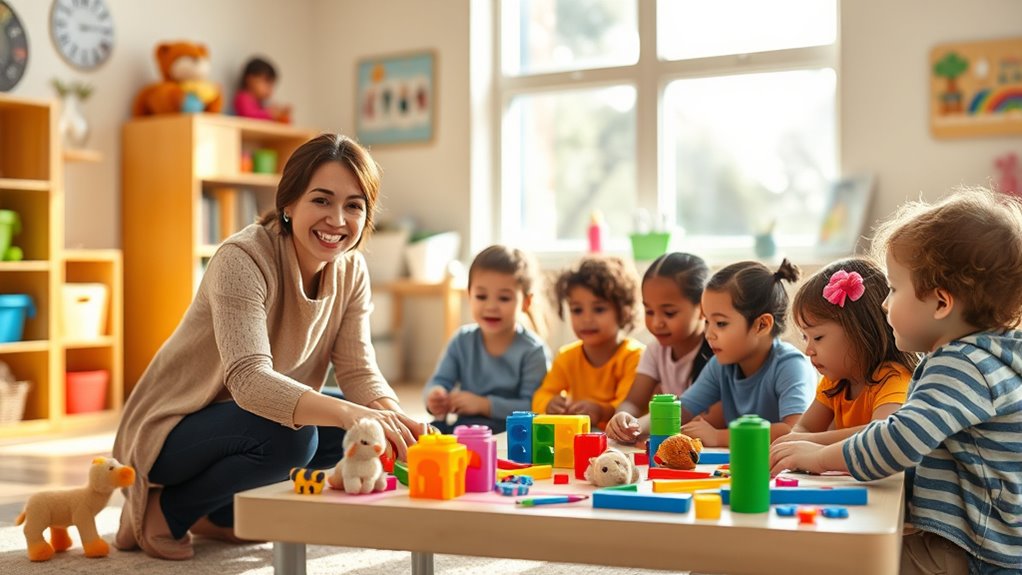As an early childhood educator, you know that play is the foundation of effective learning. It transforms education into an engaging and memorable experience, nurturing curiosity, social skills, and creativity. Play encourages children to explore, ask questions, and develop confidence through active participation. When you incorporate play into your lessons, you foster a love for learning that lasts a lifetime. Keep exploring these strategies, and you’ll discover even more ways to inspire young minds.
Key Takeaways
- Play-based learning fosters curiosity, engagement, and social skills essential for lifelong development.
- Incorporating music and outdoor activities enhances memory, language, and physical growth through active participation.
- Combining sensory play with exploration creates memorable, multisensory educational experiences.
- Play supports problem-solving, creativity, and emotional intelligence by encouraging exploration and collaboration.
- Active play builds confidence, attention span, and enthusiasm for learning in early childhood.

Have you ever wondered why early childhood education is so essential? It’s because this stage shapes a child’s foundation for lifelong learning, curiosity, and social skills. One of the most effective ways to foster development during these formative years is through play. When you integrate play into learning, you tap into a child’s natural enthusiasm, making education engaging and memorable.
Early childhood education builds a child’s foundation for lifelong curiosity, learning, and social skills through playful, engaging experiences.
Music integration is a prime example of how play can boost learning. When you incorporate music into activities, children don’t just listen—they participate, sing, dance, and create. This active involvement helps improve memory, language skills, and emotional expression. For instance, singing nursery rhymes or rhythm games encourages children to develop phonemic awareness, which is crucial for reading readiness. Plus, music fosters a sense of community as children sing together, learn to take turns, and express themselves freely. You’ll notice that children who engage with music regularly tend to be more attentive and confident, making learning both fun and effective.
Outdoor exploration is another vital aspect of play that enriches early childhood education. When you take children outside, you open the door to endless opportunities for discovery. Nature becomes a living classroom where kids can observe plants, animals, and weather patterns firsthand. This hands-on approach stimulates their curiosity and enhances their understanding of the world around them. Outdoor exploration also promotes physical development—climbing, running, jumping—all of which strengthen muscles and coordination. It’s a way to encourage problem-solving, as children navigate different terrains or investigate natural objects. Moreover, outdoor settings naturally foster social skills; children learn to collaborate, share, and communicate as they explore together. Through outdoor exploration, you’re not only teaching children about nature but also helping them develop resilience and independence. Incorporating exposure to nature and sensory activities further supports their cognitive and emotional growth.
When you blend music integration with outdoor exploration, you create dynamic learning experiences that resonate on multiple levels. Imagine children moving to the rhythm of nature sounds or creating musical instruments from natural materials during outdoor activities. Such experiences deepen their engagement and reinforce learning through multisensory play. The combination of these play-based strategies keeps children motivated and helps them develop critical thinking, creativity, and emotional intelligence.
In early childhood education, you’re not just imparting facts—you’re nurturing a child’s curiosity and love of learning. Play is the bridge that connects knowledge and experience, and by harnessing music and outdoor exploration, you make education lively, meaningful, and impactful. Your role as an educator is to facilitate these playful moments, knowing that they lay the groundwork for confident, curious, and well-rounded learners.
Frequently Asked Questions
How Does Play Influence Emotional Development in Young Children?
Play profoundly influences emotional development in young children by fostering emotional resilience and social bonding. When you encourage play, you’re helping children navigate feelings, cope with challenges, and build confidence. During interactive play, they develop empathy and strengthen relationships with peers. This process boosts their ability to handle emotions, adapt to new situations, and form secure attachments, laying a foundation for healthy emotional growth and social skills throughout their lives.
What Are the Best Types of Play for Different Developmental Stages?
You should focus on selecting play types suited to each developmental stage. For infants, sensory activities enhance exploration and brain development. As children grow, Montessori methods promote independence and hands-on learning through structured play. For preschoolers, incorporating more complex sensory activities and creative play helps develop social skills and critical thinking. Tailoring play to their specific needs guarantees they build essential skills while enjoying the learning process.
How Can Parents Incorporate Play Into Daily Learning Routines?
Think of daily routines as a treasure map, guiding your child to discovery through play. You can incorporate creative activities like drawing or storytelling, and outdoor exploration to spark curiosity. Turn chores into fun, like singing while cleaning or counting steps outside. By weaving play into everyday moments, you nurture your child’s growth, making learning an exciting adventure rather than a task. This approach turns routine into a rich, engaging experience.
Are There Specific Play Strategies That Support Children With Learning Differences?
You can support children with learning differences by using specific play strategies like sensory activities, which help with focus and emotional regulation. Incorporate peer interactions to build social skills and confidence. Observe their preferences and adapt play to meet their needs. Engaging them in these targeted activities fosters growth, encourages communication, and makes learning enjoyable, helping them thrive through play-based approaches tailored to their unique challenges.
How Do Cultural Differences Impact Perceptions of Play in Early Education?
You might think cultural differences complicate play perceptions, but understanding diverse cultural norms actually enriches your approach. These norms shape how children view play—some see it as essential, others as less important. By embracing varied perspectives, you create an inclusive environment that values all children’s backgrounds. Recognizing these cultural influences helps you adapt your strategies, ensuring every child feels seen and supported through play-based learning.
Conclusion
Remember, play isn’t just fun—it’s how children learn and grow. By creating engaging, playful environments, you help young minds develop critical skills and a love for learning. So, next time you see a child exploring or pretending, ask yourself: aren’t those moments priceless for their future? Embrace the power of play in your teaching, and watch as curiosity, confidence, and creativity flourish in every child you nurture.









